Planescape: Torment. A classic of the RPG genre, frequently propped up as the unattainable ideal all other RPGs should strive to. For once, I agree with the fandom. Torment is a fantastic game. Or rather… some of it is. While many people have said a lot about the game’s writing, themes or setting, its more mechanical aspects – the engine and the AD&D 2e rules – usually go unmentioned. Owing to my nature as a meddler, I am about to mention them with extreme prejudice.
For those in the audience unaware of the game, a brief introduction. Planescape: Torment takes place in the Planescape setting for the second edition of Advanced Dungeons & Dragons. Specifically, the inter-planar city of Sigil, shaped like a torus orbiting a massive spire in what some say is the center of the multiverse. At first, at least. It only gets weirder from here.
The game starts when our protagonist wakes up on a mortuary slab. He’s apparently human, his skin a mess of scars. He remembers absolutely nothing: not even his own name, let alone how he wound up on that slab. He is joined by a floating, chattering skull named Morte, and sets out to get out of the building, and find out who he is. All he has to go on are cryptic instructions someone left him – tattooed on his back. This involves cutting things out of zombies’ mouths, dressing up as one… and gets weirder from there, once again. The protagonist’s moniker is “The Nameless One” (henceforth TNO, for short).
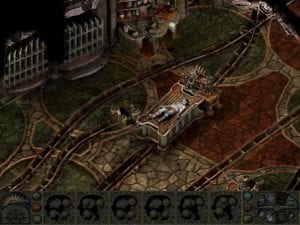
I won’t talk much about the details of the story. There are likely people reading it who haven’t played the game, and 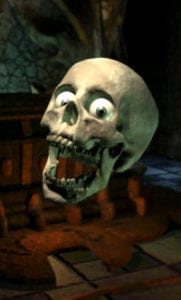 in that case spoiling it would be a crime. The story of Planescape: Torment concerns identity and belief. A recurring question is “what can change the nature of a man?”Sprawling dialogue trees require more engagement than the usual “click on everything to learn all the information” approach. Clashes of beliefs are more important than those made with weapons or magic.
in that case spoiling it would be a crime. The story of Planescape: Torment concerns identity and belief. A recurring question is “what can change the nature of a man?”Sprawling dialogue trees require more engagement than the usual “click on everything to learn all the information” approach. Clashes of beliefs are more important than those made with weapons or magic.
It may feel uncharacteristic of me to gush over something, but I do love the writing in this game. This article, though, is about something that I don’t like in this game.
Planescape: Torment is, like I said, based in the AD&D 2e ruleset. That is unsurprising, since the Planescape setting was made for that system in mind. So the game was always going to use those rules in order to take place in that setting – and it really wouldn’t be the same outside of Planescape. But I’m inclined to treat it as quite unfortunate.
Let’s start with the basics. Most of the system’s mechanics are going to happen under the hood, as it were, and many players won’t notice them. The most evident elements are class and attributes that everyone is going to have.
The attributes are strength, dexterity, constitution, intelligence, wisdom and charisma. The first four are rather self-evident. The last two, less so. Wisdom is historically a very awkward attribute, since it governs strength of will, awareness and “common sense”. Its status remains to this day, because the last thing any edition of D&D will do is change something that’s familiar. Charisma is a general “personality” attribute, that governs inter-personal reactions. After all, while TNO is unlikely to make a good first impression, no one says he can’t have a way with words.
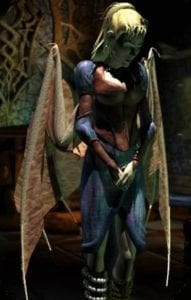 The three classes available to the TNO are fighter, mage, and thief. The classics. Regardless of his attributes, TNO begins play as a fighter, and must learn magic or thievery later on, after seeking out a teacher. All his companions share those classes, save for one who is a cleric, which TNO cannot become. Allegedly, this is because no deity in the multiverse wants anything to do with him, but the NPC cleric is one following a philosophy, rather than a deity. Other AD&D classes, such as rangers, bards or druids, are absent.
The three classes available to the TNO are fighter, mage, and thief. The classics. Regardless of his attributes, TNO begins play as a fighter, and must learn magic or thievery later on, after seeking out a teacher. All his companions share those classes, save for one who is a cleric, which TNO cannot become. Allegedly, this is because no deity in the multiverse wants anything to do with him, but the NPC cleric is one following a philosophy, rather than a deity. Other AD&D classes, such as rangers, bards or druids, are absent.
And this is where problems start. AD&D is a team game focused in no small part on combat and problem-solving. As such, there’s an expectation that one member of the team will be a fighter, or something similar, and have more brawn than brains. One member of the team will focus on doing the talking, and so on.
Not so in Torment. Here, the scarred amnesiac we control handles all the social interaction. And because so much of the plot revolves around talking to people and searching for the truth, intelligence and wisdom are absolute must-haves. Technically, you don’t have to raise them, but if you don’t, you’re losing out on half of the game. Intelligence allows you to think through problems, come up with insightful answers and solve riddles. Wisdom has a similar function, but it also helps TNO recall buried memories of his past.
It means that even if you play a fighter or thief, your first priority will be to be smart. Don’t get me wrong, there’s a definite charm to playing someone who can discuss philosophy and crack open a devil’s skull with equal ease – but it’s something of an illusion of choice.
In fairness, strength and dexterity come up in conversations too. Strength can let you intimidate people, or perform feats of pure brawn. Dexterity is, on occasion, able to perform sleight of hand, such as stealing something. But those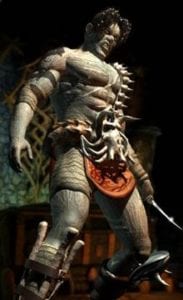 are comparatively rare. As such, a warrior will need strength less than intelligence or wisdom. Likewise a thief with dexterity.
are comparatively rare. As such, a warrior will need strength less than intelligence or wisdom. Likewise a thief with dexterity.
In truth, a thief doesn’t even need dexterity that much. Skills like stealth and lock-picking don’t need it, so it only governs your chance to avoid attacks, and efficiency with ranged weapons… which TNO can’t use.
Charisma and constitution are off to the side a bit. Charisma is certainly useful, and it opens up its own dialogue choices. But it’s less crucial than intelligence or wisdom. Constitution increases TNO’s health and rate of regeneration since he constantly regains health at all times. Useful, but the points are better spent elsewhere. There’s plenty of other sources of healing.
As you can imagine, mages come out on top here. They already need intelligence to learn their magic. They don’t need strength, or dexterity that much. So they’re free to invest in intelligence and wisdom, which will open up all the dialogue options for them. Leftovers to go charisma.
Mages get more content than the other two classes in general. Becoming a mage involves a lengthy quest with some interesting writing. A mage gets extra dialogue at certain points. Also, one of the TNO’s companions has a long quest-line that only mages can reveal. Said line is one of the finest examples of writing in the game – but only a mage TNO can access it. Granted, a fighter or thief can quickly change their class to a mage in order to do it. But that requires knowing it’s there, first.
The thief class gets it the worst, however. TNO can learn the art of thievery, but… there’s not much to do with it. 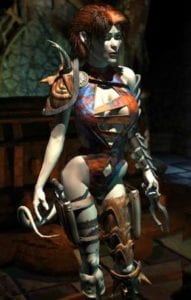 What few locks and traps there are can be easily handled by one of the companions he meets in his travels. So the class’s only selling point is being able to deal powerful back-stabs from stealth. That has its charms, but gets old eventually.
What few locks and traps there are can be easily handled by one of the companions he meets in his travels. So the class’s only selling point is being able to deal powerful back-stabs from stealth. That has its charms, but gets old eventually.
Really, the classes almost feel like an obstacle. Something that has to be there, because the game uses a particular framework.
You can see the basic conflict here. Torment is a game whose strength is its writing, interacting with a variety of characters, and discussing ideas. It’s a search for the truth and identity. But it utilizes a ruleset designed (poorly) to portray a group of adventurers fighting monsters, delving into dungeons and traversing wilderness.
Which brings us to combat again. This is where the big problem lies. What I’ve discussed so far can be chalked up to my own quibbles, while combat is the major point of disassociation. It crops up, frequently. And it’s… not very good. It’s rather unwieldy, for one. There’s no proper status bar, so all the information takes the form of floating bars of text that disappear soon. There’s not a lot of possible tactics, either short-term or long-term. So what happens is that you click on enemies and cast whatever spells you may have until they all die. Not terribly riveting.
Which becomes an issue when the game throws random encounters at us. Random thugs in the streets, rats and undead in the tunnels, monsters in the sewers… the list goes on. It ends up an unfortunate chore between the actually interesting parts of the game.
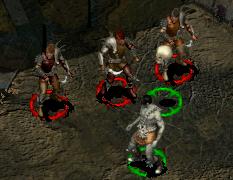
There are those who go as far as to say that Torment would have worked better as an adventure game or visual novel, without combat at all. I don’t think I agree with that. I believe combat does have a place in it. Sigil is a dangerous place, the other planes TNO goes to even more so. His search for truth brings him in touch with dangerous people and beings. Violence is both an option and a necessity.
Still, it needs to mean something and fit in the context of the story. Ideally, it should be a choice. Solving a conflict or problem through violence is a decision in its own right. Threatening someone with violence, likewise. If you go into a place like flooded sewers of an inter-planar city, or literal Hell, meeting dangerous people and creatures is also a given.
That’s not really an excuse to have areas filled with nothing but enemies to grind down, with an occasional trap, though. Which Torment unfortunately does. I think it’s ultimately part of its genre baggage. As a computer RPG based on AD&D, regular combat encounters are just expected.
If the fights were more enjoyable, as opposed to being an exercise in attrition, this would be less of an issue. But mandatory combat encounters without much meaning still don’t suit the game very well.
The pinnacle of this problem is the Modron Maze: a massive, randomly-generated labirynth of rooms filled with enemies. The entire place is a pastiche on classic dungeon-crawling – so really, it’s meant to be dull and repetitive. That’s cold comfort for a player who has to trawl through it, though.
It’s tempting to ignore it… if it weren’t for the fact that you need to explore the maze in order to find a unique, 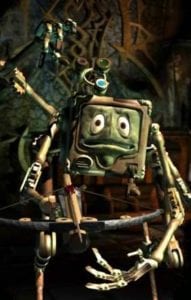 fascinating character who can join TNO’s band of misfits. And you can’t blaze a quick trail towards him (it? them?), because the maze is always going to look different. Kind of a quintessence of this game’s combat, really.
fascinating character who can join TNO’s band of misfits. And you can’t blaze a quick trail towards him (it? them?), because the maze is always going to look different. Kind of a quintessence of this game’s combat, really.
Just like combat, I think the numerical attributes, skills and other mechanical trappings also have their place. They add a layer of replayability; what will happen if I do this, instead of that? There are situations with a limited amount of moral or philosophical choice, but plenty of it in terms of skills you bring. Planescape: Torment just uses a set of rules particularly ill-fitting for its purposes.
What would be my ideal mechanics for the game? That’s a topic for a whole article, really. There’s a lot that could be done, but ideas are cheap. One thing is clear: mechanics should serve the story in a game like Torment. That means being able to create a TNO who can’t fight at all, as well as a TNO who can fight having more ways to influence the story than just grind down random enemies. A greater variety of skills than just the fighter/thief/mage template. And so on.
Combat would always have to be a choice. Even if you’re up against an enemy that you can’t reason with – giant albino crocodiles, ravenous ghouls or devils – engaging them shouldn’t be mandatory. This could be an opportunity to break away from the assumption that’s common in RPGs, that combat is the “default” choice, and avoiding it tends to yield better results. Why not have a situation where you need to work around a problem, but being good enough to punch through nets you a reward? That, of course, needs a combat model that doesn’t boil down to a numbers game.
Perhaps it’s just my preference for RPGs, as opposed to adventure games, speaking. And I’m not too familiar with “visual novel”-style games, I’ll admit. But I think Planescape: Torment’s true nature is that of an RPG. It would just need a proper shape.
For all my grousing and grouching here, I recommend this game to anyone who might not have played it yet. It’ll take you on a wild ride, make you think and surprise you. You probably won’t even notice all the stuff I complain about here. See you in the Cage, cutters.
Images courtesy of Black Isle Studios

